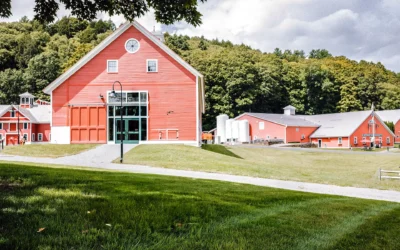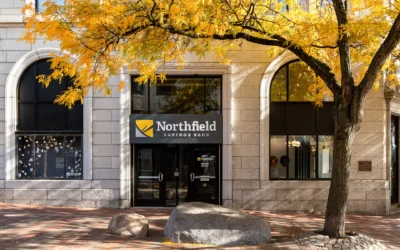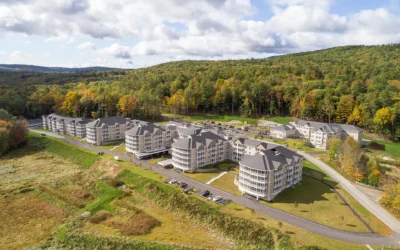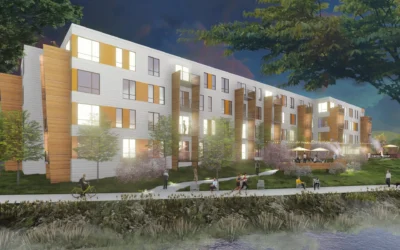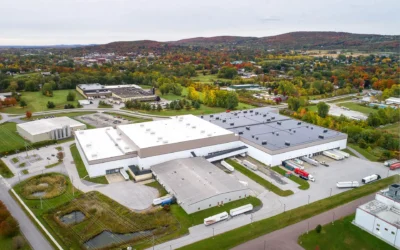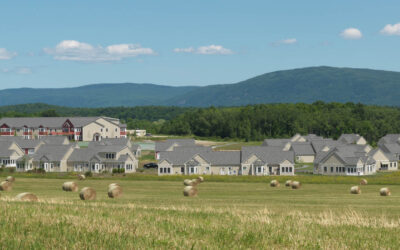DEW is an Environmental Partner with Vermont’s Small Business Administration. Annually we must calculate our consumption of environmentally friendly goods and provide data on what we did with our waste. 2011 Main Office Data (includes adjoining businesses): Total waste was 16.77 tons. 7.02 tons were recycled and 3.9 tons were composted, representing a 65% diversion rate. Simply put; 1/3 of all our waste went to a landfill and 2/3 did not. Additionally, Office Manager Janelle Leduc prioritizes purchases of green (green seal) and recycled products. 2011 Project Data: DEW projects track their waste data and here are a figures for a few projects. Boltwood Place Apts (demo and new construction): 60% recycled/diverted Jay Peak Hotel Jay & Waterpark (new construction): 18% recycled/diverted Castleton Facility Barn (new construction): 31% recycled/Diverted Castleton New 2012 Hall (new construction): 48% recycled/diverted Malone Border Station (new construction): 75% recycled/diverted Bennington State Office Complex (demo and new construction): 87% recycled/diverted Certainly, DEW is doing its part to keep waste out of landfills. There are two landfills in Vermont and the Moretown facility is close to capacity. When these fill, trash might have to go out of state which would represent a cost increase to all citizens.
Green Construction
Two DEW Projects Receive LEED Certification
Williston, VT– DEW is happy to announce that two projects built by DEW have officially received US Green Building Council LEED certification. On April 25, 2011, Moe’s Southwest Grill received a Silver rating. The 2,900 square foot restaurant, located in Williston, is the first LEED Certified restaurant in Vermont and incorporates several state-of-the-art energy efficient elements. On May 5, 2011, The Putney School Field House project received a Platinum rating (the highest possible rating). The Field House project is 16,800 square foot net-zero energy field house that produces as much energy as it uses over the course of a year. There are only a handful of net-zero energy buildings in the United States-The Putney School Field House is the nation’s first net-zero energy secondary school building and Vermont’s first commercial net-zero energy building. LEED, Leadership in Energy and Environmental Design, is the nationally-accepted standard and rating system for high performance (green) buildings developed by the U.S. Green Building Council.
Putney School First Net-Zero Commerical Building in Vermont
PUTNEY, VT– The Putney School, DEW Construction Corp. and Maclay Architects, cut the ribbon Saturday, October 10th on its 16,800 square foot net-zero energy field house that will produce as much energy as it uses over the course of a year. There are only a handful of net-zero energy buildings in the United States-The Putney School Field House is the nation’s first net-zero energy secondary school building and Vermont’s first commercial net-zero energy building. Of the project’s $6 million budget,$5.1 million was spent on building construction. “We want to show the world that net-zero energy technology for public buildings exists right now,” says Putney School Director Emily Jones. “It’s time to move net-zero energy buildings from the theoretical realm into reality.” By definition, net-zero energy buildings generate as much energy as they consume over the course of a year. The energy used is usually produced on-site and comes from renewable energy sources such as wind, solar, geothermal, or biomass. These buildings are designed to minimize the use of natural resources and energy. According to Architect Bill Maclay, whose firm designed The Putney School Field House, such buildings not only protect the environment by minimizing energy use and reducing the need for outside (fossil fuel-based) energy sources, they pay for themselves through improved efficiency and lower operating costs and help avoid the risks associated with fuel price volatility. Over the course […]
DEW Employees become Green Advantage Certified
DEW Construction Corp. is happy to announce that 17 employees recently become Commercial Green Advantage Certified Practitioners. Green Advantage is an environmental certification for building-related practitioners – primarily contractors, subcontractors and trades people. Certified individuals have successfully passed the Green Advantage Certification Exam demonstrating knowledge of current green building principles, materials, and techniques. Commercial, Residential, and Commercial/Residential Certifications are available, with a specific exam required for each. Because the green building field is rapidly changing, candidates must pass a Re-certification Exam every three years in order to remain Green Advantage Certified. Congratulations to the following employees: Chris Bertrand, Field Engineer Matt Cadieux, Foreman Tim Heinlein, Project Manager Greg Leech, Project Manager Mary Lintermann, VP of Business Development Dana MacArthur, Assistant Superintendent Bob Maccini, Business Development Manager Steve Morton, VP of Business Development Jennifer Nemi, Business Development Administrator Tony Papa, Superintendent Todd Poirier, Superintendent Doug Robie, Safety/Health/Environment & Risk Dan Salmonson, Superintendent Tim Urie, Project Engineer Willis Whitacker, Superintendent Justin Yandow, Estimator Doug Young, Estimator
DEW’s Aiken Hall Project Receives LEED Gold Certification
Burlington, VT – Champlain College celebrated it’s first LEED (Leadership in Energy and Environmental Design) certified building, Wednesday, October 21 at Aiken Hall at Champlain College. This is the College’s and DEW’s first Gold Rating for new construction. Aiken Hall is the 5th Project in Vermont to achieve a LEED Gold rating. A few features that contributed to Aiken’s LEED certification include: Energy Efficient lighting, heating and elevator installation, Improved building envelope through insulation upgrades, Salvaged hard-wood floors and re-use of many original building materials, Slat roof shingles and the selection of other regional building materials, Construction waste diverted from landfill and often donated to Re-Cycle North, Access to alternative transportation options such as CCTA buses and CareShare Vermont. DEW’s 2nd “certified” project, Aiken, was built in 1885 and 100 percent renovated in 2008 to serve as the home of Champlain College’s CORE education department, with faculty offices, meeting rooms and special event facilities. Designed in the Queen-Anne Style, the three-story wood framed and masonry building was originally a residence, and converted to a dormitory in the 1980s. Aiken Hall is a historic building, listed on the Vermont Historic Sites Register and is a significant symbol of the historic “Hill Section” neighborhood developed from the 1870’s to the early 1900’s in Burlington. DEW currently has 9 LEED registered projects pending certification.
